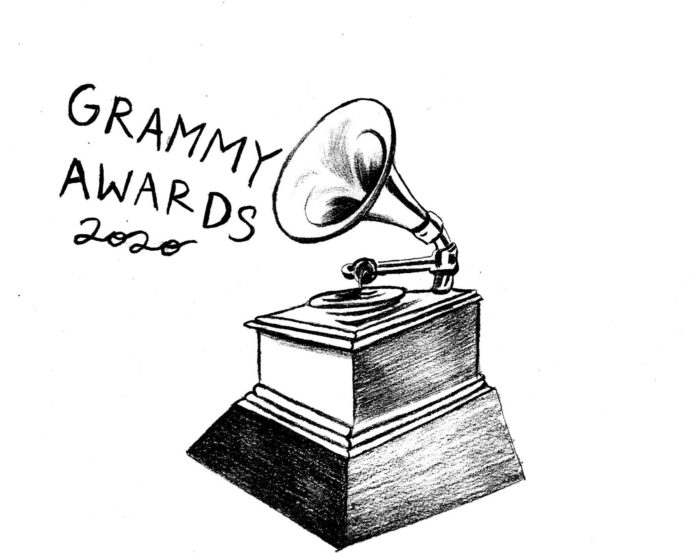The 62nd annual Grammy Awards came and went. A small handful of music’s most popular acts gathered at the Staples Center to be honored by The Recording Academy Jan. 26. The traditional malaise of such an insular industry showcase became an afterthought to the same-day tragic death of global sports icon Kobe Bryant. However, problems within the Academy predate this year’s ceremony. In their chase to catch up with popular music’s ever-shifting digital landscape, a longstanding question lingers regarding the Academy’s lack of clear criteria and existential justification.
In 2016, the Academy introduced new eligibility guidelines to include recordings released exclusively on streaming platforms like Spotify, Apple Music and SoundCloud. This means online mixtapes, containing the best rap music for the last 15 years, were deemed worthy to compete against physical albums. Of course, it seems this was only done to reward independent Apple Music employee Chance The Rapper with the 2017 award for Best Rap Album. The nefarious relationship between the Academy and major streaming companies does little to inspire faith in a meritocracy. Rap became a recognized category at the Grammys in 1989, but it continues to suffer from a flattening misrepresentation at the hands of casual or out-of-touch voters. Now, in an effort to unveil the potential pop-star class of the new stream-dominant decade, the Academy’s incoherent list of nominees and winners spreads across the genres.
The key results of the 2020 Grammy Awards fail to ward off the recent allegations of internal corruption and favoritism made by former Recording Academy President and CEO Deborah Dugan. In her official complaint, Dugan claims the voting process is used as a platform for Academy members to enhance personal and business relationships with artists.
“The Board also manipulates the nominations process to ensure that certain songs or albums are nominated when the producer of the Grammys, Ken Ehrlich, wants a particular song performed during the show,” Dugan alleges.
If the Grammys Awards are built to blend economics and art, then fine, but compromising the selection process to promote an event damages their institutional credibility. This year’s selections paint a picture of the music world as a small bubble of homogeneous artists in order to reinforce our new streaming model. An astounding 20 total first-time nominations split between Lizzo, Billie Eilish and Lil Nas X embody the Academy’s desperation. The unlimited promotion of these artists serves as a warning that we are only a few moves away from the official sponsorship title “The Grammy Awards: presented by Spotify and Apple Music.”
18-year-old Eilish picked up five wins out of six as she swept through the night’s premier categories. Her shuffling whispers and goth femme fatale raps on the album “When We All Fall Asleep, Where Do We Go?” proved enough to land Best Pop Vocal Album, Best New Artist, Album of the Year, Record Of The Year and Song of the Year. Penny Fractions author David Turner predicted this when he wrote that multifaceted marketing efforts behind Eilish represent “the commitment of an entire industry to stand behind a single teenager to sell the idea of music streaming to a new generation.”
The online portal Statistica reports that with 4.99 billion streams, Eilish ended2019 as the third most popular musician in the U.S. At a young age, she boasts a winning profile. Still, for the Academy’s interests, what looks like a fresh perspective may just be the new insistence on using streaming as their metric and vehicle of cultural momentum.
Eilish’s album is idiosyncratic, but the deserved winner is Vampire Weekend’s nominated record “Father of The Bride.” Lead singer Ezra Koenig penned the year’s most insightful and honest pop lyrics throughout the edifying trio of tracks “This Life,” “Sympathy” and “Harmony Hall.” On the latter, he spins America’s political fracture into poetry from a bird’s-eye view.
“Anybody with a worried mind could never forgive the sight/Of wicked snakes inside a place you thought was dignified/I don’t wanna live like this, but I don’t wanna die,” Koenig sings.
The specifics may differ for coalitions across the country, but the pressure-filled sentiment endures. “Sympathy” is an echoing dance track about the simplistic formation of personal and political bonds. The palpable care that went into the sweet rhythms of “Father of The Bride” converted me into a fan. The expected decision was Lana Del Rey’s evolved singer-songwriter skills on “Norman Rockwell!” Her album checks the traditional boxes of a safe choice for the Grammy’s Album Of The Year. Ultimately, the Academy decided Billie Eilish should be the youngest artist ever to win the award.
If these choices was designed to retain viewership from a millennial audience, it failed. The 2020 Grammy Awards television rating slipped to an all-time low for adults aged 18-49. Lost in all the hype was the biggest snub of the Awards, with Bobbie Gentry’s “The Girl from Chickasaw County: The Complete Capitol Masters” losing out in the Historical category.
The 2020 Academy proves it can’t get the present or the past right: Gentry’s 8-disc box set compilation album was the finest release of the year. It reminds us that music discovery demands we look backward as well as forward.
![]()































